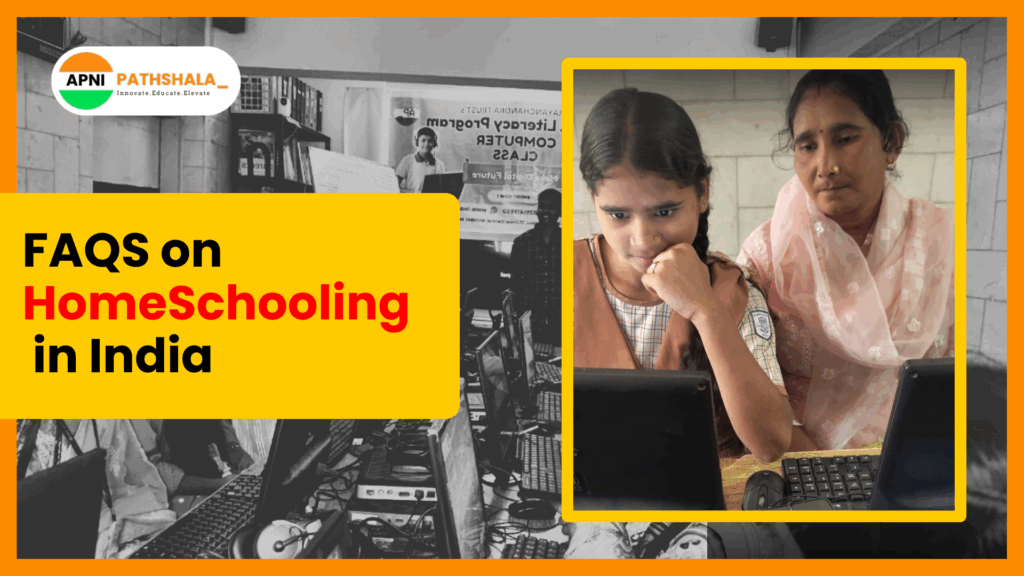FAQS On Homeschooling in India 2025

Is school really the only way to educate a child in India?Short answer: No.Better answer: Welcome to homeschooling in India, where learning actually makes sense. If you’re tired of this rat race for marks, and the overall education system that doesn’t even make any sense in big 2025, Homeschooling is the option for you. Thousands of parents across India are now understanding this concept and choosing freedom and real learning for their kids. And guess what? You don’t need a fancy degree, an expensive setup, or someone’s approval to homeschool. All you need is the right information, and that’s exactly what you’ll find here. Ready? 1. What is homeschooling, and how is it different from regular schooling? Homeschooling means teaching your child at home instead of sending them to a traditional school. It doesn’t mean you sit for 6 hours with textbooks. It means: No uniforms. No exams for the sake of exams. Just actual learning. 2. Is homeschooling legal in India? Short answer: Yes. But let’s break it down. There’s no law in India that says homeschooling is illegal. The Right to Education Act (RTE) says every child has the right to education, but it doesn’t say schooling is the only way. In fact, multiple High Court judgments (including Delhi and Tamil Nadu) have recognized the right of parents to homeschool. So yes, you can legally homeschool in India in 2025 without worrying about court cases or jail time. You don’t need: You just need a genuine intent to educate your child well. 3. Can I homeschool under CBSE or ICSE? CBSE and ICSE currently do not allow private candidates (unless through NIOS or state boards). But here’s the trick: you can: 4. Do Indian colleges accept homeschooled students? 100%, yes. Colleges care about your board certificate, not where you studied. If your child clears 12th via NIOS or IGCSE, they’re eligible for: A lot of students who cracked top exams in recent years had alternative education backgrounds, some even unschooled till 10th. So no, homeschooling won’t “spoil” your child’s future. If anything, it might unlock it. 5. How do I start homeschooling in India? Starting homeschooling in India can feel like a big decision, but taking it step by step will make it much easier. Here’s how you can get started: 6. Do I need to register somewhere for homeschooling? No. There’s no formal registration required for homeschooling in India (as of 2025). But keep records of your child’s learning journey, just in case you need it later for exams or transitions. 7. How Much Does Homeschooling in India Cost? Let’s be very clear: Homeschooling does not mean expensive international schools. You can homeschool in India for as low as ₹3000/month, or go as high as ₹30,000/month depending on your style. Here’s a quick cost table: Style Monthly Cost (Approx) Includes Budget ₹2,000–₹5,000 NCERT books, free apps, DIY worksheets Balanced ₹5,000–₹10,000 Live online classes, tutors, and paid apps Premium ₹15,000–₹30,000+ International curriculum, mentors, pods Homeschooling lets you control the budget, unlike fixed private school fees. 8. Do I have to be a trained teacher to homeschool? Not at all. You just need patience, curiosity, and a willingness to learn with your child. Use online resources and community support to guide your journey. 9. What are the benefits of homeschooling in India? 10. What are the challenges of homeschooling in India? 11. Can my child go back to regular school later? Yes. Schools may ask for an entrance test or interview. Just keep records of your child’s learning. 12. Are there support groups for homeschoolers in India? Absolutely. Look for: Final Thoughts: Homeschooling isn’t just an educational method. It’s a mindset shift. You don’t need to be perfect. You just need to care. Start with free community classes, attend a few homeschooling meetups, or download a weekly planner.Read success stories and explore options at Apni Pathshala: one of India’s most trusted learning communities.Your child deserves a life of curiosity, confidence, and freedom.And you have the power to give it to them.
